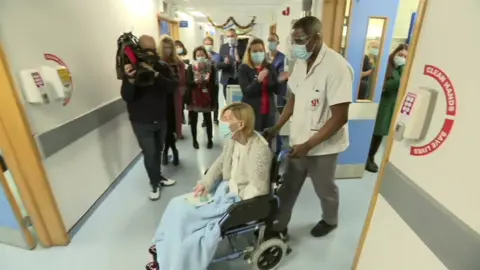Covid-19: Republic of Ireland begins vaccine rollout
A 79-year-old woman has become the first person in the Republic of Ireland to receive a Covid-19 vaccine.
Grandmother of 10, Annie Lynch, from Dublin, received the Pfizer/BioNTech vaccine at St James's Hospital on Tuesday.
Regulation to authorise the use of the Pfizer vaccine was signed by the Republic's Health Minister Stephen Donnelly last Thursday.
Ms Lynch said she felt "very privileged" to receive the jab.
"I really feel like there is a bit of hope there now," she said.
 RTÉ
RTÉ "It's brilliant that it's here."
Ms Lynch added that everything had been "explained very clearly" to her before the vaccine was administered.
The first batch of Pfzier vaccines arrived in the Republic of Ireland on 26 December.
That was two days after the country returned to stricter coronavirus restrictions on Christmas Eve with the closure of restaurants, hairdressers and gastro pubs.
The Republic's Health Minister, Stephen Donnelly, said the first vaccination was "a ray of light after what has been a trying year in our country".
"Our healthcare workers have worked day and night to care for their patients throughout this pandemic," he said.

Allow X content?

"I would like to acknowledge their dedication and commitment and thank them for the central role they will play as we now move into administering the vaccines."
In a tweet, Mr Donnelly added that the Republic of Ireland had begun "a new and hopeful chapter in [its] fight against Covid-19".
The first vaccination was also hailed as a "wonderful occasion" by Prof Sam McConkey from the Royal College of Surgeons in Ireland.
"I think this is a day for celebration and for hope - it's like Christmas; it's like new year; it's like the days getting longer," he told the BBC's Evening Extra programme.
"It's really fantastic, we're really relieved and happy."
Effectiveness
Prof McConkey, who is head of the college's Department of International Health and Tropical Medicine, said that many people had feared that it would take much longer to develop an effective vaccine.
He said that a combination of more money, more staff and new technology had resulted in the production of three different vaccines within 12 months of Covid-19 being identified.
He speculated that some vaccines may turn out to be more effective for very elderly patients, while some may be more suited to younger people, and some may be better at preventing transmission of the virus.
"So as we learn more and more about the vaccines, I hope that we've a useful collection of them that can be targeted in different ways."
The UK was the first country in the world to start using the Pfizer vaccine after regulators approved its use on 2 December.
A 90-year-old woman from Northern Ireland was the first person in the world to receive the vaccine outside trial conditions, when she was vaccinated against the virus at University Hospital in Coventry, England, on 8 December.
A follow-up injection is administered within three weeks, and Margaret Keenan was given her second dose at the same hospital on Tuesday.
In Northern Ireland, nurse Joanna Sloan became the first person to be vaccinated against Covid-19, getting her first dose on 8 December, shortly after Ms Keenan.
